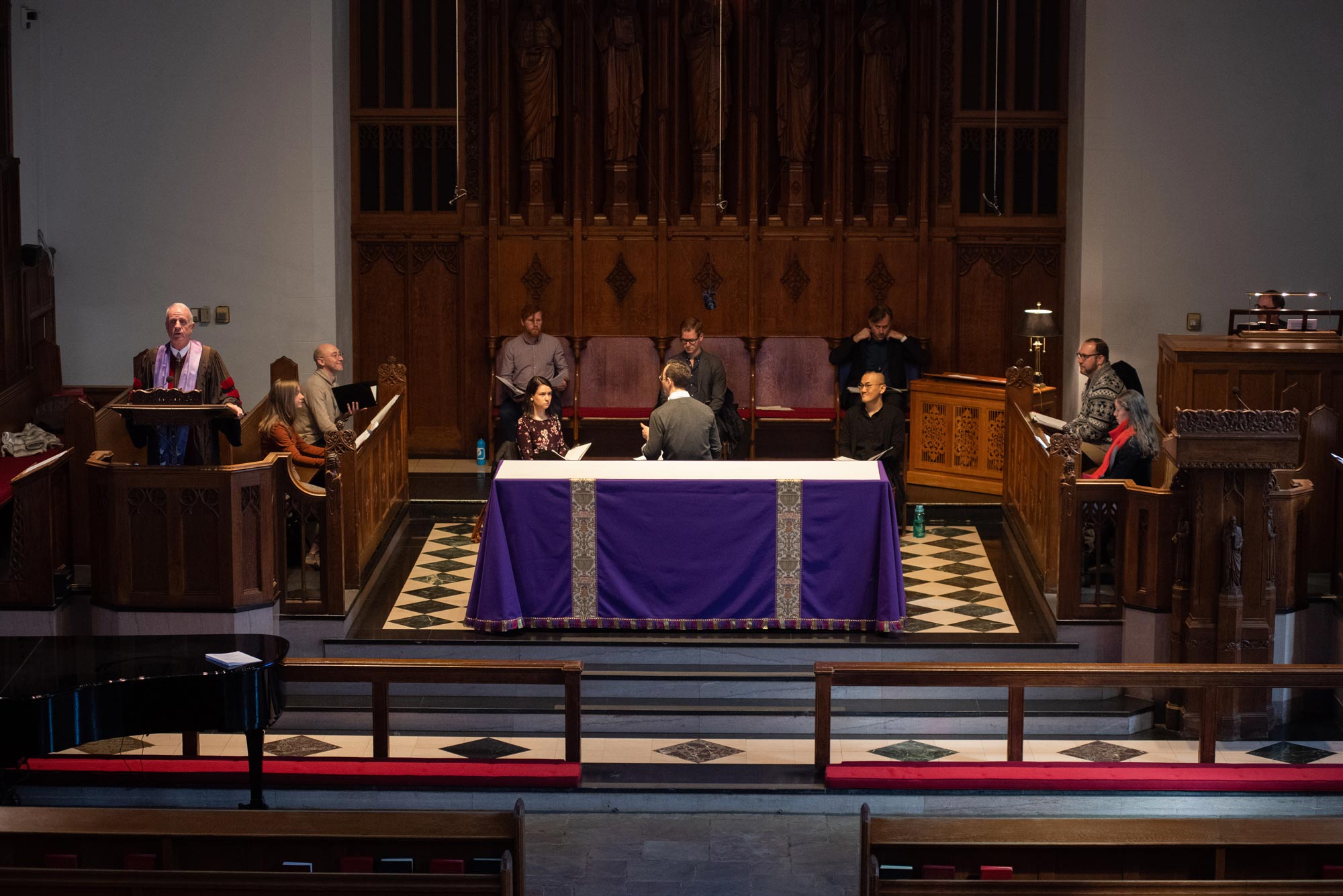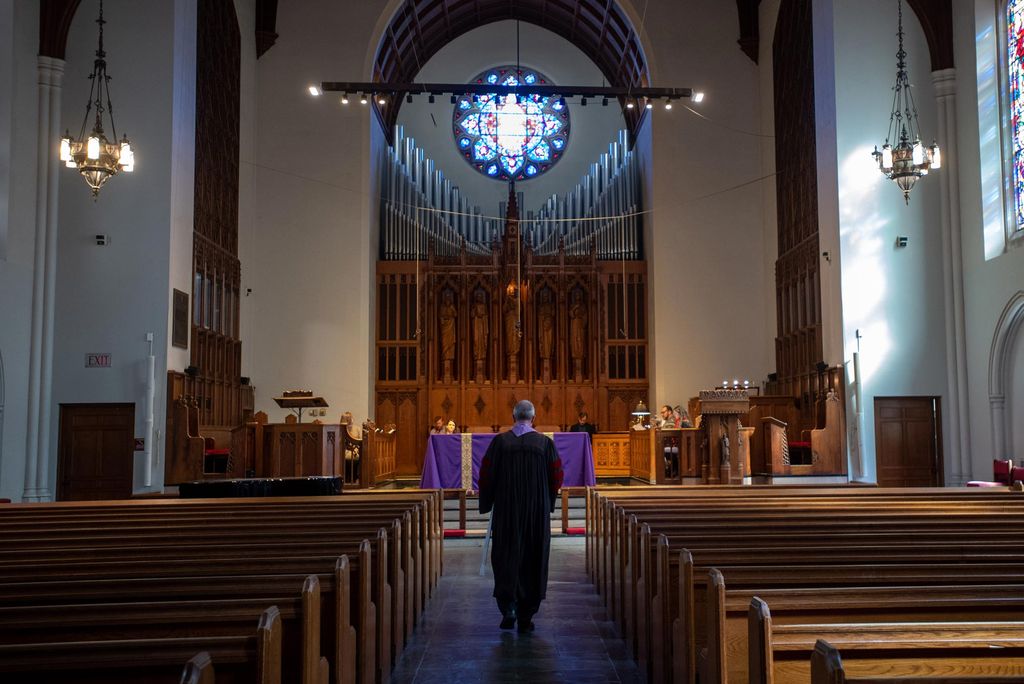Preaching to an Empty Church: Marsh Chapel Dean Robert A. Hill on Ministry in the Age of Coronavirus

The Rev. Robert Hill, dean of Marsh Chapel, along with eight choral scholars (distanced six feet from one another), preached to an empty church March 22 as on-premises worship at Marsh Chapel has been suspended.
Marsh Chapel Adjusts Its Ministry in Response to Coronavirus
Dean Robert Hill on holding virtual worship services and other changes wrought by the pandemic
A man with an obviously prodigious memory, the Rev. Robert A. Hill has long memorized his weekly 2,200-word sermons so he can look congregants in the eyes while preaching Sunday worship. “There was no earthly reason for that” last weekend, however, says the dean of Marsh Chapel, “with nobody there to look at.”
Viral ministry for a viral pandemic: March 22 was the first Sunday under the chapel’s suspension, through at least April 12, of on-premises worship due to the coronavirus pandemic. (You can still listen to the 11 am service live on WBUR 90.9, BU’s National Public Radio station, and at wbur.org.) With Massachusetts banning large gatherings (and advising residents to stay at home as of March 24), Hill’s sermon addressed the discombobulating feel of this moment.
”An Easter without lilies, the first in 42 years,” he lamented, as no congregants will be present to enjoy them. He also confided how the virus has upended his personal life: he is unable to visit his 90-year-old mother in her nursing home, off-limits to visitors to protect residents. “She’s over in Rochester, N.Y., so I don’t get there very often to visit her in any case,” he tells BU Today. “My sisters have to take her needs to the door and drop them off. It’s a difficult time. It’s a time of dislocation.”
Hill, who has been dean of Marsh Chapelfor 14 years, is also a School of Theology professor of New Testament and pastoral theology. He spoke with BU Today about Marsh Chapel’s ministry in the age of coronavirus.
Q&A
With Rev. Robert A. Hill
BU Today: What was preaching to the first physically empty church like last Sunday?
Hill: There was no worry about somebody falling asleep.
Once, way up on the Canadian border, I had a winter day where I had two churches, and when I drove out to one, the only person there was the organist. I said, “Well, I guess we can go through with the service.” And he said, “Rev. Hill, I don’t put my hay out in front of one cow only.” Other than that, this was the first time. We just had me and eight choristers. Nobody in the pews.
We had waves and waves of people writing in on March 22, more than usual, thanking us for having the service available online and by broadcast.
Worship aside, ministry involves many face-to-face interactions. How have those changed? You’re teaching and counseling remotely?
The course I am teaching at 8 o’clock on Mondays is pastoral leadership. It’s a course about everything you do but Sunday—not preaching, sacraments, liturgy, worship—but counseling, pastoral care, development, stewardship, finance, conflict resolution, community ministry, denominational work, education, Christian education, youth ministry. All of that normally is very present and personal. Especially counseling, but we’re in a time where you can’t do that.
After church Sunday, I had a 1 pm session. It was a couple that I had married some years ago who wanted to talk about something. First we were going to do it in person, then by Zoom, then we ended up doing it by phone. It works OK. But there’s no substitute for being physically present. We don’t bury people normally at a distance. We don’t marry people normally at a distance. We don’t do counseling at a distance.
At least with the phone, there is the voice without the distraction of other things. I spent all morning teaching on Zoom. I am OK with Zoom. Presence, number one, is best.
How are marriages and funerals affected?
Our building is closed right now. We had a wedding cancel, and that was sad. I was able to help them privately, but the wedding was canceled. We had a few funerals canceled or postponed. We can’t, in Marsh Chapel, do those gatherings. The memorials or funerals are a ways off, but the wedding we just had to cancel.

How hard is it to not be able to provide your flock with any sort of physical contact?
It’s hard. Think of all of the events that we’ve been through. The Boston Marathon [bombings], the Trump trauma of 2016, all of them have affected people. It’s best to be able with people to walk through it. Especially those who are particularly stigmatized, depressed, or anxious.
What do we do? We go other routes. I make four or five phone calls every day. We try and stay in touch with our people that way. We’re able to go in every home around the globe, virtually, if people tune in. We have a very traditional service, 60 minutes. It’s three hymns, two anthems, a 20-minute sermon and off you go. The Bible says one does not live by bread alone, and people need the rhythms of life and worship and daily prayer. This is a virtual worship service. We’re glad for that, and I look forward to the day, I hope not too far into the future, when we can be gathered together again.
As a minister, you look after other people’s well-being. Who looks after yours?
I don’t know if I mentioned to you that I am married?
I do believe in the power of prayer and in daily meditation. I tell my students that you need to take an hour a day, a day a week, some part of a week every quarter, and then one chunk of the year, like summer. The caregivers need to be very careful about self-care, because otherwise you snap. It’s not just the ministry. Look at what happens with public school teachers. Look at what happens with nurses. Look at what happens with first responders.
Are there particular passages you turn to for comfort?
I love Philippians: “Have no anxiety, but in all things, in prayer and supplication, with thanksgiving, lift your needs to God.” That’s a daily one for me. I recite, every day, as my devotion, the Ten Commandments, the Apostle’s Creed, the Lord’s Prayer, and Romans 12:9-13: “Let love be genuine, hate what is evil.” I believe in the power of prayer, and it doesn’t even have to be overly religious. We have this thing called the Esplanade that you can walk. People need to give themselves space and time for contemplation.
The Marsh Chapel Interdenominational Protestant Worship Service is a weekly hour-long poem of liturgy, music, and homily offered in the nave of Marsh Chapel every Sunday at 11 am, broadcast live on the radio in New England on WBUR 90.9 FM, live-streaming on the internet at wbur.org, and available later in the week and throughout the year by podcast.


Comments & Discussion
Boston University moderates comments to facilitate an informed, substantive, civil conversation. Abusive, profane, self-promotional, misleading, incoherent or off-topic comments will be rejected. Moderators are staffed during regular business hours (EST) and can only accept comments written in English. Statistics or facts must include a citation or a link to the citation.